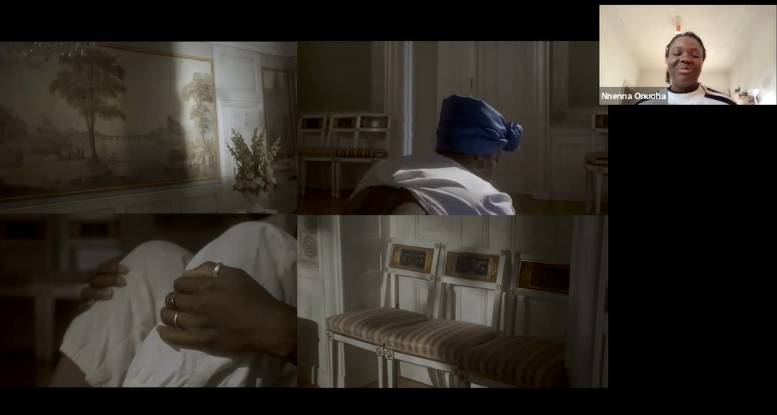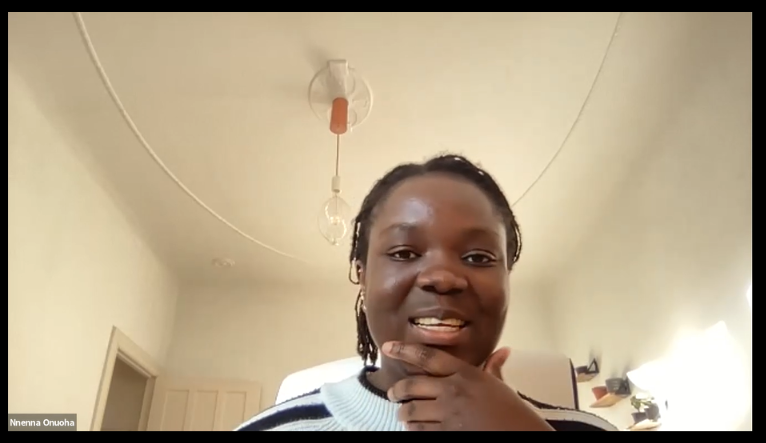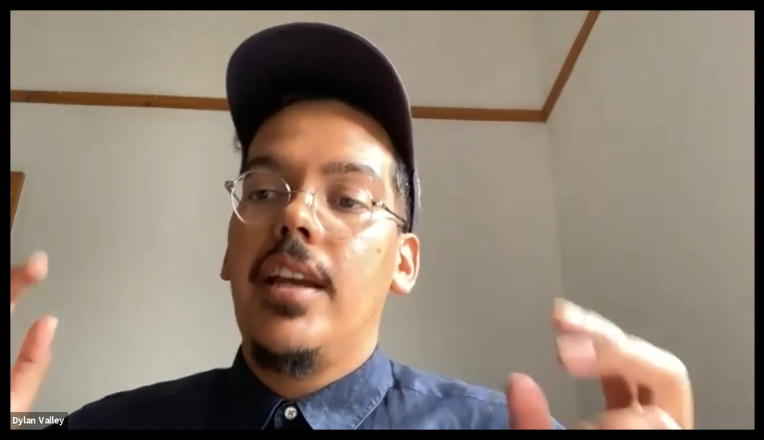Hauntings - 29 October 2021

In this session Nnenna Onuoha’s talk titled, 'Filming Ghosts, Silences and Hidden Things', drew examples from past experiences, particularly the making of the short film “Rosenfelde” during her residency with Dekoloniale Berlin in 2021. A second strand of her work focuses on archiving Black experience in the present to chronicle how, amidst all this, we practice care and repair for ourselves and each other. She shared her audio-visual work which focuses on turning to ghosts and speculation in spaces where the past cannot directly be engaged, due to outright denial or other bureaucratic obstacles. Her films and videos centre Afrodiasporic voices to explore monumental silences surrounding the histories and afterlives of colonialism across West Africa, Europe and the US, asking: how do we remember, which pasts do we choose to perform, and why?
Further reading:
Cifor, M. (2015). Presence, Absence, and Victoria's Hair: Examining Affect and Embodiment in Trans Archives. TSQ,2(4). 645–649.
Falzeti, A.G. (2014). Archival absence: the burden of history. Settler Colonial Studies, 5. 128-124.
Onuoha, N. (2022). Educated There, But Employed Here: The Unique Experiences of Internationally Educated Nurses. [Unpublished doctoral thesis], City University of New York.
Ortolja-Baird, A. & Nyhan, J. (2022). Encoding the haunting of an object catalogue: on the potential of digital technologies to perpetuate or subvert the silence and bias of the early-modern archive. Digital Scholarship in the Humanities, 37(3). 844-867
Sengupta, R. (2020). Towards a Decolonial Media Archaeology: The Absent Archive of Screenwriting History and the Obsolete Munshi. Theory, Culture & Society, 38(1). 3-26
Speaker Bio: Nnenna Onuoha is a Ghanaian-Nigerian researcher and artist based in Berlin. She is currently a doctoral researcher in Anthropology with Critical Media Practice at Harvard University. She collaborated with the Making Differences team at CARMAH, 2018-20, as a visual anthropologist, and organized the CARMAH Kino. She also taught “Visualizing Culture”, an undergraduate course about the methods and theory of ethnographic and documentary cinema. See the film, Rituals (2020), which she directed with historian and writer Edna Bonhomme for AlphaNova Galerie Futura. She is now a Chief Museum Education Officer of the National Commission for Museums and Monuments, Nigeria, currently working at the National Museum Oyo (Commonwealth Association of Museums).
Discussant Bio: Dylan Valley is filmmaker and media studies scholar as well as a lecturer in the Centre for Film and Media Studies at the University of Cape Town.
by Lily van Rensburg
The Spirals virtual seminar series session on the 29th of October hosted Nnenna Onuoha, a Ghanaian-Nigerian researcher and artist based in Berlin, as the speaker with Dylan Valley, a filmmaker and lecturer in the Centre for Film and Media Studies at the University of Cape Town, as the discussant. Titled Hauntings, it explored depictions of ghosts and spirits as entry points into histories of slavery and colonialism that are met with denial or revisionism.

Nnenna Onuoha presented three short films as case studies. They address the silences and archival gaps in the histories of slavery and colonialism in places she has lived and worked in the past. For example, Onuoha attests to the history of Budapest’s human zoo, in which living black African people were displayed as living ethnographic objects, in the short film Journey with John. Using satire and exaggeration as cinematic devices, she points to the absurdity of early ethnographic films and the authority with which ethnographers recounted the lived experiences of others.

Onuoha’s final short film shown in the session, Rosenfelde addresses the absence of slave histories at the Friedrichsfelde Palace in Berlin. Onuoha collaborated with performers, dancers, musicians and cinematographers to embody ghosts of history and provide a speculative account of the palace’s colonial history. In doing so, Onuoha pays respect to the enslaved people who vicariously inhabited the palace in the past and affirms their presence within the present. Rosenfelde echoes the work of Carine Zaayman, who developed the ‘anarchive’ as a means through which to acknowledge the absence of presence (Zaayman, 2014:319).
In both Lagos, Lagos and Rosenfelde, Onuoha fabulates rather than reconstructs the lives of people who occupied the spaces she explores. History is not defined by fact, but by the inclusions into and exclusions from the archive by those in positions of power. Onuoha demonstrates that it is the duty of artists, filmmakers, and ordinary people, to challenge the archive and elevate those narratives that have been purposefully excluded from the historical record.

Thinking about it from my research context, the dual histories presented in Onuoha’s films are much like those embedded in the physical landscape of Cape Town. Cape Town’s historical landscape separately records a glorified and realist version of events, with, for example, a statue of Jan Smuts positioned at the entrance to the Slave Lodge. Onuoha’s films Journey with John, Lagos, Lagos, and Rosenfelde provide quintessential examples of how we might begin to acknowledge the intersections between these histories and address the gaps in the archive which have allowed for them to be ignored.
Lily van Rensburg has a Bachelor of Arts specialising in Film and Media Production from the University of Cape Town. She is pursuing a career in heritage conservation and has previous experience working as a production manager, photographer, and art cataloguer. Lily is particularly interested in the transparency of arts institutions, and their willingness to make privately held information publicly accessible. In her Honours in Curatorship research she engages with Afrikaner nationalism and apartheid era art, investigating ways of dealing with such complex and violent collections in the political climate of today.